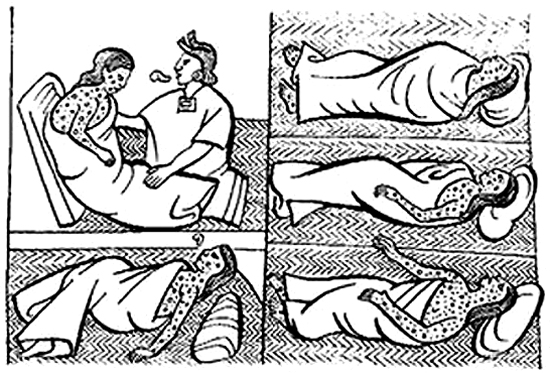
Diseases in the New World
Return
Wyatt served as English ambassador to Nueva España.
At that time, the Spanish discussed the cultural differences
of the Indianos vs Ibearians: its political and religious
consequences, as well as the opposing views of the near-feudal
encomenderos (conquistadores) with their claims to permanent
estates and New World slaves. Such permanent estates would
undercut Crown claims to Nueva España, destroying Crown
unification of a Spanish empire. Furthermore, wanton murder
and rape of Indianos would make a desert of Nueva España,
bereft of laborers, requiring the import of African slaves
(which did in fact take place, first in Nueva España at
Hernán Cortés' Marquesado del Valle de Oaxaca).
Instead, thoughts about rights and obligations that would protect
the Indianos are broached in ballad LXXX. 1
Circa 1600, Enclosure Acts excluded serfs from access to land
previously held in common, using fences to exclude serfs.
Wealthy aristocrats and Guild aldermen benefited by seizing
these lands. The capital thus gained could be employed by investing
in city industries, overseas investments such as in the Low
countries, Italy, even in the South Caspian, or the New World.
Effectively the aristocrats were focused in agrarian estates, but
were simultaneously functioning as investment bankers, using the
capital acquired through land seizure to finance colonial expansion,
through slavery, sugar plantations, shipping, etc. Thus the sonnets
celebrated aristocratic class love literature, but also bourgeois
values as seen in Thomas Wyatt's Ballad LXXX and John Donne's Elegy
XIX, as well as racism.
Thus we see that Elizabethan poetry was not simply "love poems",
but instead included rhetorik of a political nature, celebrating
colonial conquest, racism, exploitation of Black and Indian slaves,
economic exloitation, exploitation of women, creation of fleets to
transport raw Colonial goods, thus Navies, creation of machinery
to refine Colonial goods (such as sugar, indigo, minerals, etc.)
Eventually, Industrial "wage" slavery and Industrial diseases, Indirect
consequences, such as the spread of diseases (Measles, Malaria,
Small Pox, Yellow Fever, the Great Pox or venerial diseases,
animal diseases, plant diseases, etc.) Destruction of the environment.
© Copyright 2006 - 2018
The Esther M. Zimmer Lederberg Trust
 Website Terms of Use
Website Terms of Use